Daily Vocabulary Words: List of Daily Used Words in Leading International Newspapers
Hi there. Welcome to this special section @ Wordpandit.
Our endeavour here is very simple: to highlight important daily vocabulary words, which you would come across in leading newspapers in the country. We have included the following newspapers in our selection:
• The New York Times
• The Washington Post
• Scientific American
• BBC
• The Guardian
• Psychology Today
• Wall Street Journal
• The Economist
We are putting in extensive work for developing your vocabulary. All you have got to do is be regular with this section and check out this post on a daily basis. This is your repository of words that are commonly used and essentially, we are posting a list of daily used words. Hence, this has significant practical application as it teaches you words that are used commonly in leading publications mentioned above.
Visit the website daily to learn words from leading international newspapers.
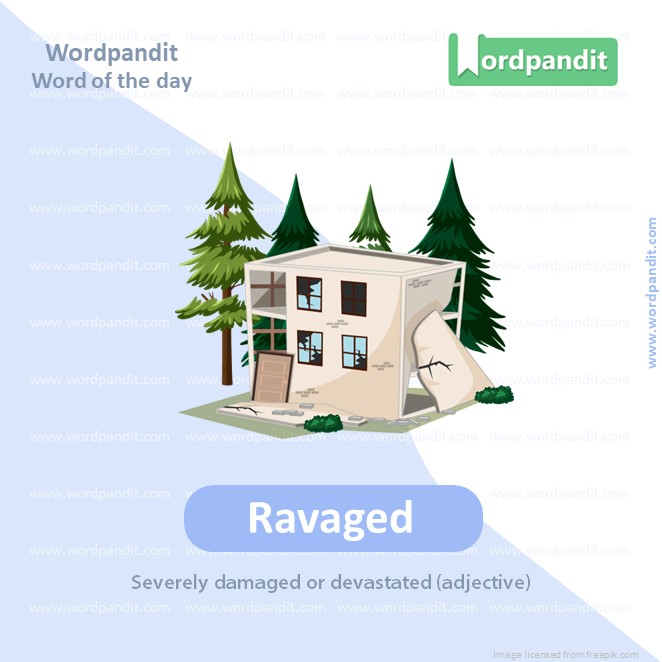
WORD-1: RAVAGED
CONTEXT: Hamas is everywhere in northern Gaza, and Israel ravaged civilian neighborhoods while it attacked.
SOURCE: New York Times
EXPLANATORY PARAGRAPH: “Ravaged” is like when something is really badly damaged or destroyed. It’s like if a big storm comes and breaks lots of trees and houses.
MEANING: Severely damaged or devastated (adjective).
PRONUNCIATION: RAV-uhjd
SYNONYMS: Devastated, Destroyed, Wrecked, Ruined, Pillaged
USAGE EXAMPLES:
1. The town was ravaged by the hurricane.
2. The disease ravaged the population.
3. Forest fires ravaged the area last summer.
4. The army ravaged the enemy’s territory.
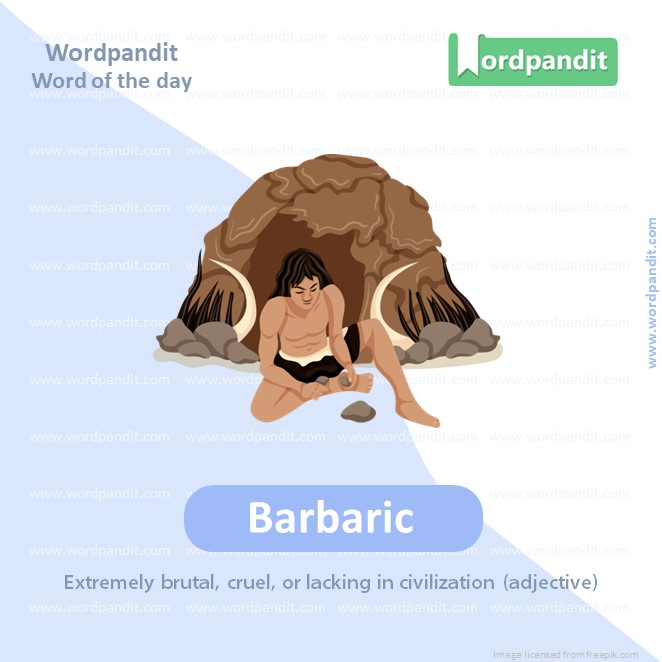
WORD-2: BARBARIC
CONTEXT: Israeli children assaulted in barbaric ways by Hamas terrorists.
SOURCE: Washington Post
EXPLANATORY PARAGRAPH: “Barbaric” means something that is very rough, cruel, and not civilized. It’s like when someone acts really mean and hurts others, not caring about being nice or kind.
MEANING: Extremely brutal, cruel, or lacking in civilization (adjective).
PRONUNCIATION: bar-BAR-ik
SYNONYMS: Savage, Cruel, Brutal, Uncivilized, Vicious
USAGE EXAMPLES:
1. The king’s barbaric actions shocked everyone.
2. They protested against the barbaric treatment of animals.
3. The movie showed a barbaric battle scene.
4. Such barbaric practices are no longer acceptable.
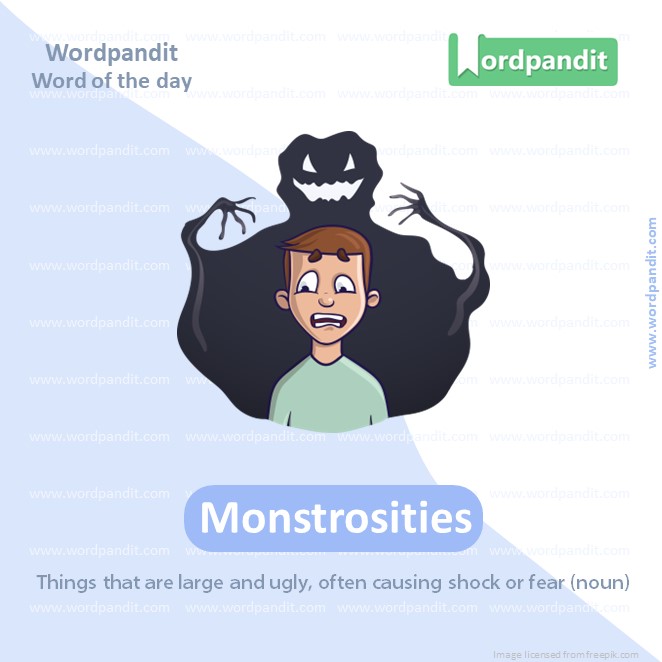
WORD-3: MONSTROSITIES
CONTEXT: The amount of death, the torture, the monstrosities were something that we never imagined.
SOURCE: Washington Post
EXPLANATORY PARAGRAPH: “Monstrosities” are things that are very big, ugly, and often scary. It’s like seeing a really large, strange-looking statue that makes you feel a bit frightened.
MEANING: Things that are large and ugly, often causing shock or fear (noun).
PRONUNCIATION: mon-STROS-i-tees
SYNONYMS: Abominations, Horrors, Eyesores, Freaks, Atrocities
USAGE EXAMPLES:
1. The old building was considered a monstrosity.
2. He created monstrosities in his lab.
3. The sculpture garden was filled with artistic monstrosities.
4. They gazed at the architectural monstrosities with awe.
WORD-4: CRATERED
CONTEXT: The school is a skeleton of cratered walls and metal frames.
SOURCE: New York Times
EXPLANATORY PARAGRAPH: “Cratered” is like when something has big holes or dents in it, similar to craters on the moon. It’s like if the ground has big holes after something heavy has hit it.
MEANING: Having craters or being marked by depressions or cavities (adjective).
PRONUNCIATION: KRAY-terd
SYNONYMS: Pocked, Potholed, Dented, Indented, Hollowed
USAGE EXAMPLES:
1. The road was cratered after the explosion.
2. The surface of the moon is cratered.
3. The field was cratered by meteorite impacts.
4. Bombing left the landscape cratered and barren.
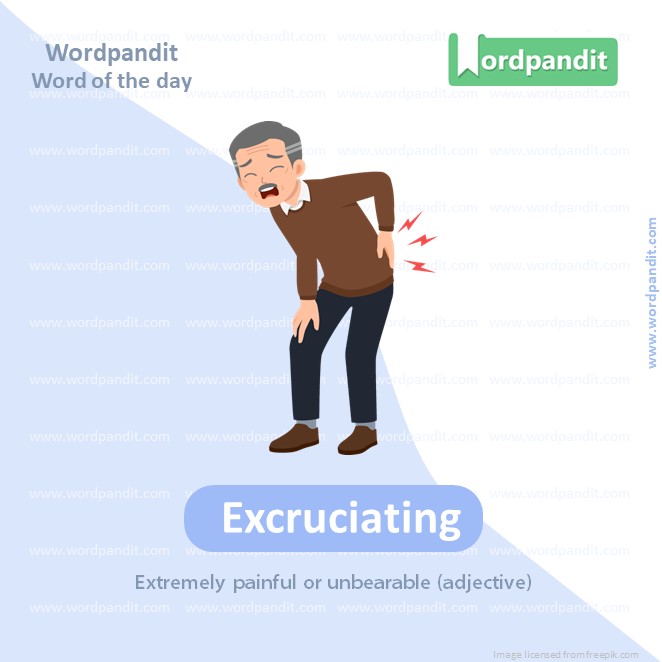
WORD-5: EXCRUCIATING
CONTEXT: This conflict has raised excruciating issues that I can’t begin to resolve.
SOURCE: Washington Post
EXPLANATORY PARAGRAPH: “Excruciating” means something is very, very painful or hard to endure. It’s like having the worst toothache ever or having to sit still for a really long time when you want to play.
MEANING: Extremely painful or unbearable (adjective).
PRONUNCIATION: ik-SKROO-shee-ay-ting
SYNONYMS: Agonizing, Torturous, Intense, Severe, Unbearable
USAGE EXAMPLES:
1. He felt excruciating pain in his leg.
2. The wait was excruciating.
3. She described her headache as excruciating.
4. The news was excruciating to hear.
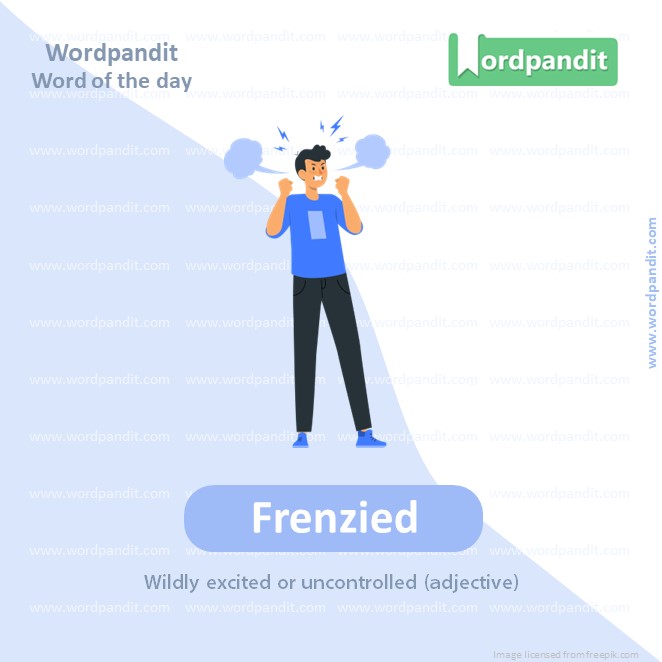
WORD-6: FRENZIED
CONTEXT: that President Biden might step away from the 2024 race (contrary to all evidence) created an endless cycle of frenzied coverage, none of it informative about democracy, the issues, or the threat of an authoritarian regime in a second Trump presidency.
SOURCE: Guardian
EXPLANATORY PARAGRAPH: “Frenzied” is when something is wild, really fast, and out of control. It’s like when everyone is running around in a crazy way, not stopping to think or be calm.
MEANING: Wildly excited or uncontrolled (adjective).
PRONUNCIATION: FREN-zid
SYNONYMS: Frantic, Hectic, Feverish, Manic, Wild
USAGE EXAMPLES:
1. The fans were in a frenzied state during the concert.
2. She made a frenzied attempt to finish on time.
3. The market was a scene of frenzied activity.
4. News of the sale created a frenzied rush.
WORD-7: PETRIFIED
CONTEXT: many Republicans are petrified about the perils of electing Trump.
SOURCE: Guardian
EXPLANATORY PARAGRAPH: “Petrified” means being so scared that you can’t move or think. It’s like being frozen in place because you saw something really frightening, like a big spider.
MEANING: So frightened that one is unable to move; terrified (adjective).
PRONUNCIATION: PET-ruh-fy-d
SYNONYMS: Terrified, Frozen, Paralyzed, Alarmed, Horrified
USAGE EXAMPLES:
1. She was petrified when she saw the snake.
2. He stood petrified with fear.
3. The haunted house left the children petrified.
4. The sudden noise left her petrified.
WORD-8: RESTRAINT
CONTEXT: One would think a modicum of restraint and humility might now guide coverage when predicting the downfall of Biden and his party.
SOURCE: Al Jazeera
EXPLANATORY PARAGRAPH: “Restraint” is like holding yourself back from doing something or keeping something under control. It’s like not eating all the cookies at once, even though you want to.
MEANING: Holding back or limiting something or someone; self-control (noun).
PRONUNCIATION: ree-STRAYNT
SYNONYMS: Control, Restriction, Moderation, Constraint, Discipline
USAGE EXAMPLES:
1. He showed great restraint in not responding to the insult.
2. The dog was kept under restraint.
3. She exercised restraint in spending money.
4. Restraint is necessary in difficult situations.
WORD-9: UNENLIGHTENING
CONTEXT: Polling fixation is unenlightening if not misleading.
SOURCE: New York Times
EXPLANATORY PARAGRAPH: “Unenlightening” is when something doesn’t help you learn or understand anything new. It’s like listening to someone talk but not learning anything interesting or useful from them.
MEANING: Not providing useful information or insight; not enlightening (adjective).
PRONUNCIATION: un-en-LY-ten-ing
SYNONYMS: Uninformative, Unhelpful, Instructive, Unedifying, Unilluminating
USAGE EXAMPLES:
1. The lecture was unenlightening and dull.
2. His explanation was unenlightening.
3. They found the book unenlightening.
4. The discussion was unenlightening and repetitive.
WORD-10: PERISHED
CONTEXT: We should send the ships instead to Gaza, where too many children have already perished.
SOURCE: Washington Post
EXPLANATORY PARAGRAPH: “Perished” means something or someone is no longer alive. It’s like when a plant dies because it didn’t get water or sunlight.
MEANING: Died, especially in a sudden or untimely way (verb).
PRONUNCIATION: PER-ishd
SYNONYMS: Died, Expired, Deceased, Succumbed, Passed away
Usage Examples:
1. Many plants perished in the frost.
2. The explorers perished in the desert.
3. Memories of those who perished were honored.
4. The fish perished due to lack of oxygen.
vocabulary building in english
The prowess of a language learner is often evaluated by their command over vocabulary. Undeniably, vocabulary building in English is of paramount importance when it comes to mastering the language. Not only does it enrich communication skills but also boosts confidence and comprehension levels. So, how can one truly succeed in vocabulary building in English?
One of the significant aspects of vocabulary building in English is recognizing your existing lexicon’s confines. The evaluation helps set definitive goals towards the expansion of your vocabulary. Subsequently, immerse yourself in English content, be it books, news articles, podcasts or movies. This immersiveness provides exposure to new words, their usage, and context, crucial elements in vocabulary building.
Now, you have identified new words, but how do you retain them? The key is reiteration and practical application. Adopt a habit of daily revision and try using the words in your conversations or writings. Don’t fear mistakes, for they are stepping stones to the proficiency you desire in vocabulary building in English.
Next, understanding the structure of the English word, utilizing the roots, prefixes, and suffixes, can significantly elevate your vocabulary building endeavor. This strategy aids in decoding a word’s meaning and can prove instrumental in expanding your word arsenal. Remember, languages often borrow words from each other, grasping these borrowed words’ roots can substantially simplify vocabulary building in English.
Lastly, incorporating fun into learning can stimulate progress. Engage in crossword puzzles, word games, or digital apps like Duolingo or Quizlet. These platforms not only provide a fun-method to reinforce new words but also help track your progress in vocabulary building in English.
To sum up, the journey of vocabulary building in English must begin from self-evaluation, proceed with content exposure, practice, decoding, and end in a fun-oriented learning approach. The intricate layering of these methods helps you unlock the essence of this globally spoken language. Remember, the process may seem tedious initially, but with time and practiced techniques, the task of vocabulary building in English will become effortless and rewarding.













